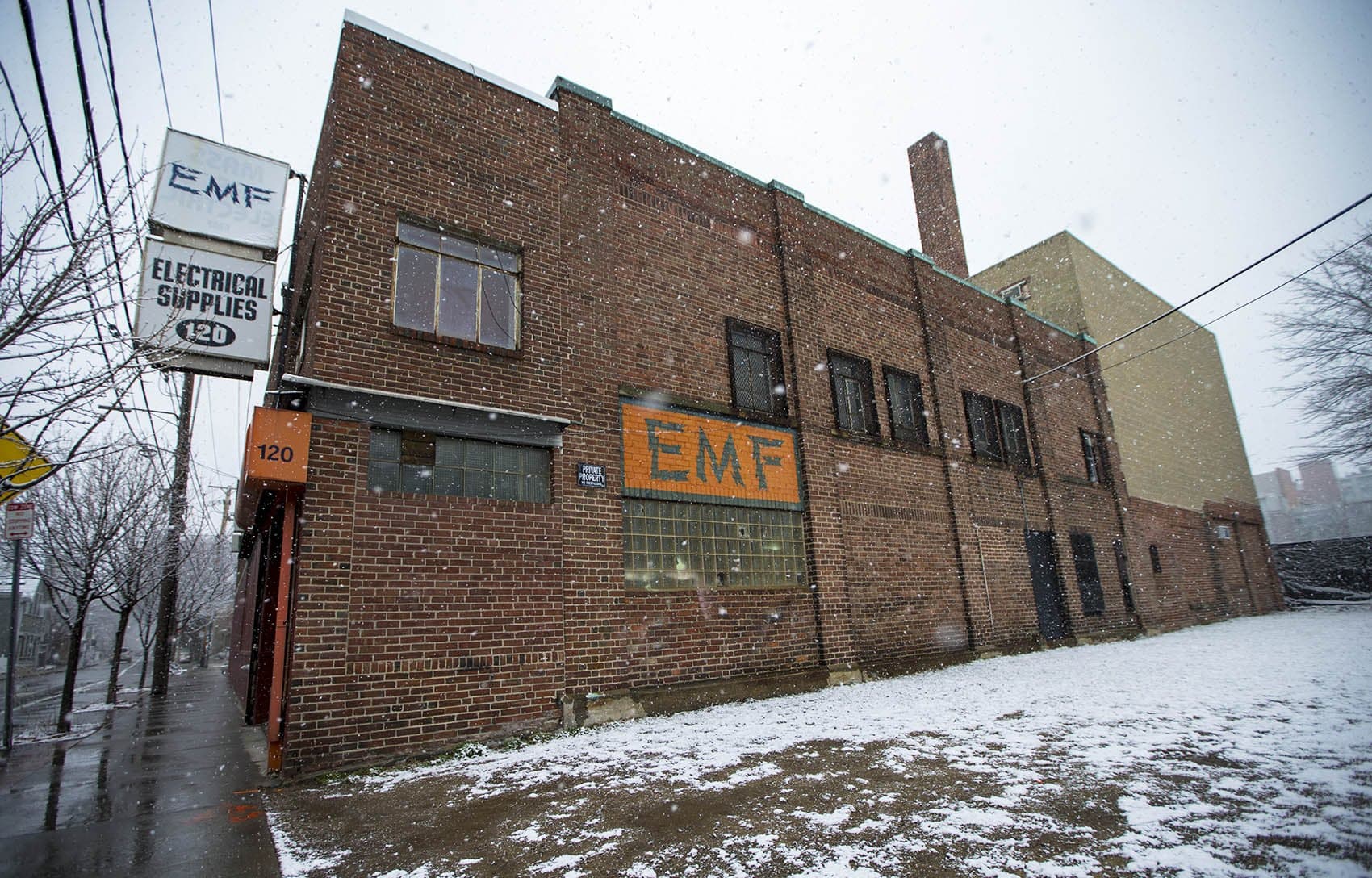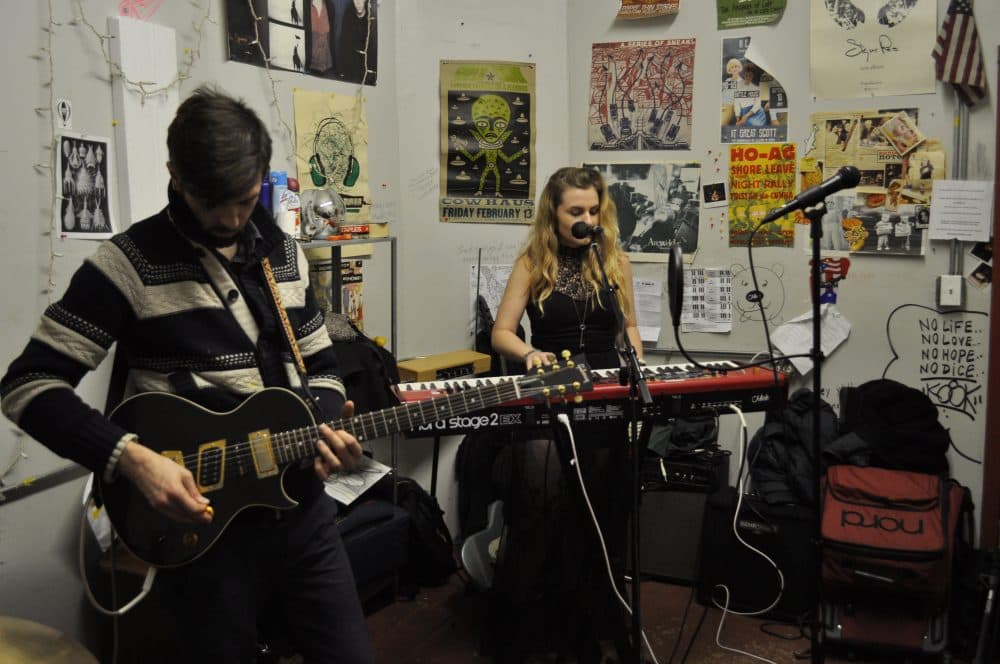Advertisement
Uproar Over Closing Of EMF Building Prompts Cambridge To Seek Solutions To Artist Displacement

On a recent Wednesday evening, the EMF Building in Cambridge’s Central Square was abuzz with the sounds of musicians at work: a drummer practicing fills, a vocalist warming up. Anna Rae, a musician in the local rock band Hemway, walked the building’s labyrinthian corridors.
“This was all full of amazing art, until the new management took over,” Rae said, gesturing at the walls. They were mostly empty, save for a few flyers and the occasional scrawl of graffiti. Soon they will be bare. The building is set to close at the end of April, leaving some 200 musicians and artists without work spaces and several businesses, including the New Alliance recording studio, without a home.
The closure of the EMF building, a former electrical supply company that for the past decade has served as a nexus for independent musicians in Cambridge, has become a flashpoint in the ongoing crisis of artist displacement in the area. The issue has crested in recent months with the closure of Central Square's Out of the Blue Too Gallery in November.
"EMF was in a lot of ways a one-stop shop. You practiced there, you met other bands there, you recorded your music there,” Rae said in an interview last month. “It was a way for emerging artists to do all the things they needed to do."
"EMF was in a lot of ways a one-stop shop. ... It was a way for emerging artists to do all the things they needed to do."
Anna Rae, musician
The three-story brick building at 110-120 Brookline St., built in 1921, takes up nearly a block in a neighborhood now teeming with condominiums, the last vestige of industry in a city where real estate is at a premium. It was purchased two years ago for $4 million by Ledgemoor, LLC and is managed by Trinity Property Management, both of which are owned by Harvard Square Business Association president John DiGiovanni. It's unclear what Trinity is planning to do with the building. DiGiovanni did not return a message left at his offices.
A campaign by users of the building has brought the issue to the attention of the city. Last week, following testimony by numerous EMF tenants during public comment, the Cambridge City Council voted to make Central Square an arts overlay district. The zoning ordinance would incentivize property owners to build performance, gallery, practice and live-work space for artists in the area — though the plan still needs to be drafted and pass through several committees before it can take effect.
And it was still too late to prevent the EMF evictions. Most of the building’s tenants were notified at the end of February, which they said didn’t leave them much time to find new space. “We can't just move anywhere, because we would be making noise violations all over the city,” said Ruby Rose Fox, a Boston Music Award-winning singer/songwriter who uses the building to rehearse and give voice lessons.
Fox emphasized the importance of affordable practice space for emerging artists. She pays $350 a month for a shared room at EMF, though when she first started renting a room in the building in 2011, she paid only $150. "The fact that I was able to have rent that low ... I've been able to grow a career making music," Fox said.
Artists and musicians interviewed for this article described room rental costs ranging from $450 to $650 per month. Most split the usage of rooms, allowing some to pay as little as $35 per month for their share.
Many artists have been unable to find suitable alternatives. Rae said that Hemway was on waitlists at three different practice spaces in the Boston area. A new venture by EMF’s building manager, Bob Logan, called SUM Studios, is slated to open in Malden in May, offering a potential home for displaced EMF tenants. But not everyone sees SUM as a viable option. “Malden is pretty far away — I don’t have a car at the moment,” said Steve Onderick, a Cambridge-based filmmaker and videographer who until recently rented studio space at EMF.
Additionally, tenants said the building’s management had led them to believe that safety concerns were behind the notice to quit. (This was confirmed in emails shared with The ARTery.) However, both the Cambridge Fire and Inspectional Services departments found the building up to code at their last inspections in recent months, according to Dan Totten, an aide for Cambridge City Councilman Quinton Zondervan, whose office looked into the matter.
"This particular case [is] especially egregious because this developer is well known in the community and been around for a long time, and has been donating money to city councilors for many years," Zondervan said.
"This particular case [is] especially egregious because this developer is well known in the community and been around for a long time, and has been donating money to city councilors for many years."
Cambridge City Councilman Quinton Zondervan
The city councilor also worried that an arts overlay district would be insufficient to fill the needs of local artists.
“Even if [developers] build some artist spaces, they'll be more expensive than what the artists have now because the building would be more high-end,” he said. “We're seeing the same thing with our residents, we're seeing the same thing with our small businesses, because the market caters to the highest bidder. So if you can't keep up, you're out of luck.”
Mayor Marc McGovern, who co-sponsored the arts overlay policy order, agreed that more needed to be done. “I want the city to be much more aggressive in purchasing property,” he said. “When we own the property, we get to decide what happens there. If the city had bought the EMF building, there would have been a discussion of what to do with that building.”
But Zondervan cautioned against characterizing a more aggressive buying policy as a panacea, pointing to the Vail Court property, which was recently seized by the city under eminent domain and is now tied up in litigation. He also noted that with property values at their current level the city was likely to get outbid.
“I think we should be doing more with the vacant property we already own. We should be doing more with working with owners of other vacant property,” Zondervan said. A new policy order, co-sponsored by Zondervan, Vice Mayor Jan Devereux and Councilor Dennis J. Carlone, would order the city manager to look into putting unused city-owned properties, as well as underutilized spaces owned by MIT, toward artistic use. It would also compel the city to reach out to Trinity Property Management in an effort to allow tenants more time to vacate EMF. The council is set to vote on the order Monday night.

Melissa Nilles, whose band, Miele, practices at EMF, said she was pleased with the city’s response so far. “I don't know if we can necessarily change what's going to happen with EMF,” she said. “But we can at least push for a better future.”
Still, there would be no replacement for the old brick building on Brookline Street in Cambridge. “EMF was one of the last spaces of its kind,” Nilles said. “I just think it’s a huge loss.”
